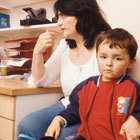GPs advised to try CBT for non-specific physical symptoms in children and their mothers

Children of women with non-specific physical symptoms are also more likely to visit the GP with such symptoms, researchers have found.
Reporting the findings in the journal PLoS ONE, they said GPs ‘should be aware’ of the link, and try ‘alternative’ approaches of treating both mother and child such as cognitive behavioural therapy (CBT).
Using UK general practice data, the team – led by Keele University primary care academics – looked at the frequency of diagnoses of non-specific physical symptoms (NSPS) in the parents of 1,328 children with at least one recorded GP consultation for NSPS over a one-year period, compared with that in parents of 3,980 control children with no GP visits for NSPS.
They found that mothers who consulted for NSPS had a 50% increased odds of their child also consulting for NSPS, compared with parents who did not consult for NSPS.
And the more visits mothers made for NSPS, the more the child consulted with NSPS – with each additional maternal visit increasing the rate of child visits by 3%.
By contrast there was no association between visits for NSPS in both parents and the child’s likelihood of NSPS visits.
The researchers said the study provides ‘further evidence that children may learn their illness and consultation behaviour from their mothers, and that recurrent consultation for NSPS in children should be viewed within a family context’.
They added that GPs ‘should be aware of the association between consultations for NSPS in parents and children, as such insights might direct medical practitioners toward alternative management approaches’.
For example, they said, ‘a recent randomised controlled trial has demonstrated that cognitive behavioral therapy (CBT) targeting children’s coping responses to recurrent abdominal pain and parents’ responses to pain in their children was associated with significant reduction in pain and gastrointestinal symptoms severity in children at six month follow-up’.
PLoS ONE 2014; available online 24 September
Pulse July survey
Take our July 2025 survey to potentially win £1.000 worth of tokens

Visit Pulse Reference for details on 140 symptoms, including easily searchable symptoms and categories, offering you a free platform to check symptoms and receive potential diagnoses during consultations.










